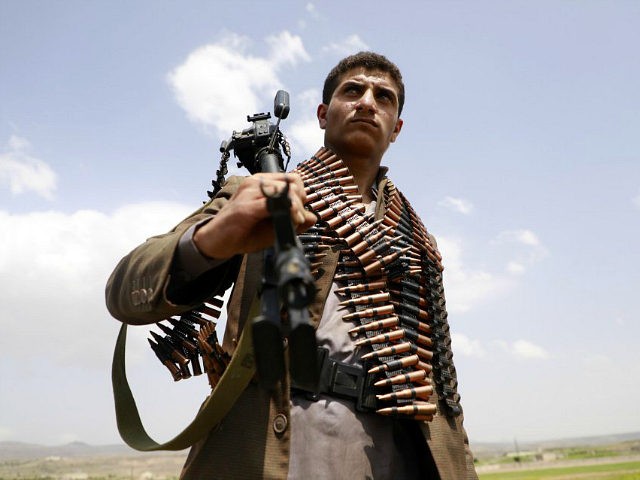The United States has joined Saudi Arabia in accusing Iran of arming the Houthi insurgents in Yemen with advanced weapons, such as the missile fired at the Saudi capital over the weekend. The White House condemned Iran’s actions as “blatant violations of international law.”
“These missile systems were not present in Yemen before the conflict, and we call upon the United Nations to conduct a thorough examination of evidence that the Iranian regime is perpetuating the war in Yemen to advance its regional ambitions,” said the White House statement.
The statement specifically referenced U.N. Security Council Resolutions 2216 and 2231, which “ban arms transfers to the Houthis and prohibit Iran from exporting all arms and related material and specifically ballistic missile-related items.”
“Houthi missile attacks against Saudi Arabia, enabled by Iran’s Islamic Revolutionary Guard Corps, threaten regional security and undermine U.N. efforts to negotiate an end to the conflict. The United States seeks a negotiated settlement to the conflict and the provision of humanitarian assistance to the Yemeni people,” the White House said.
On Tuesday, U.N. Ambassador Nikki Haley cited information released by Saudi Arabia that indicted a missile fired at Saudi Arabia in July was a Qiam missile from Iran, which she said was “a type of weapon that had not been present in Yemen before the conflict.” She said the missile shot down near Riyadh on Saturday “may also be of Iranian origin.”
“We encourage the United Nations and international partners to take necessary action to hold the Iranian regime accountable for these violations,” said Haley.
Saudi Arabia’s U.N. ambassador, Abdallah al-Mouallimi, wrote a letter to the U.N. Security Council and Secretary-General insisting that the weekend missile attack “may amount to a war crime” and promising his government would take “appropriate measures to respond to these terrorist acts.”
Iran’s ambassador fired back with a letter calling the Saudi accusations “baseless and unfounded.”
In a press briefing on Tuesday, State Department spokeswoman Heather Nauert said, “we haven’t made that determination” as to whether the Houthi missiles were provided by Iran. She refused to state definitively whether the missile attack on Riyadh would be considered an act of war by Iran if it could be confirmed as the supplier of the weapon, saying that she would not comment on “hypotheticals.”
Speaking at a cabinet meeting on Wednesday, Iranian President Hassan Rouhani warned the Saudis, “You are mistaken if you think Iran is not your friend, but the US and Israel are. This mentality is a strategic mistake and miscalculation.”
“You are well aware of the power and status of the Islamic Republic of Iran. Those more powerful than you have failed to do anything against the Iranian nation. The US and its lackeys mobilized all their equipment and power, but they could not do anything,” Rouhani told the Saudis, recalling an all-out American invasion of Iran that no one else can quite remember.
Rouhani added some harsh words about the Saudi military intervention in Yemen in a passage that sounded suspiciously like Iran justifying the illegal arms shipments to the Houthis that it claims not to have made.
“How should the Yemeni nation respond to bombardment on such a scale?” he asked. “They are told not to use their own weapons. Well, stop the bombing and see whether or not the Yemeni nation responds positively. You do not allow delivery of medicine, food and UN assistance to the Yemenis. Is what you are doing reasonable and Islamic?”
For good measure, he accused the Saudis of attempting to overthrow the Lebanese government and creating ISIS to terrorize Syria and Iraq.

COMMENTS
Please let us know if you're having issues with commenting.